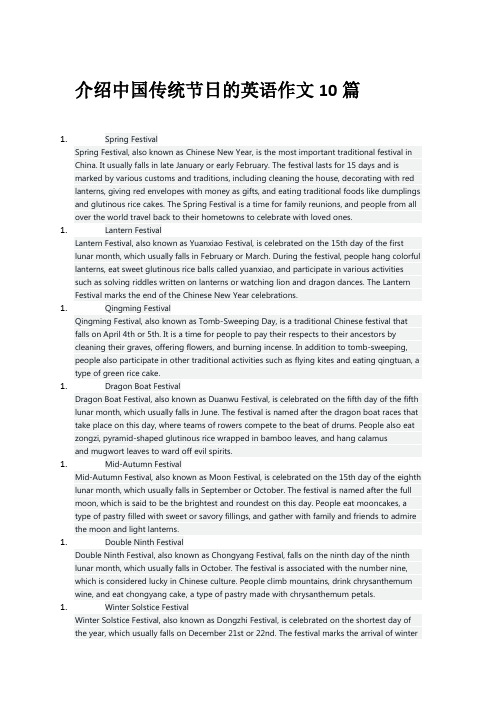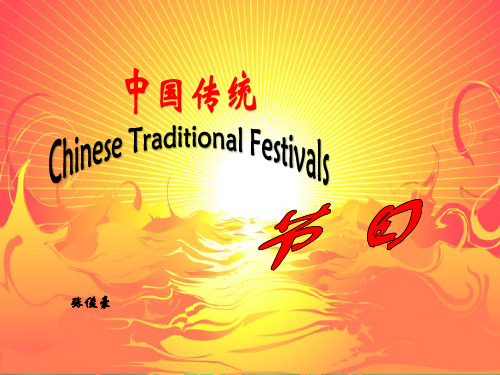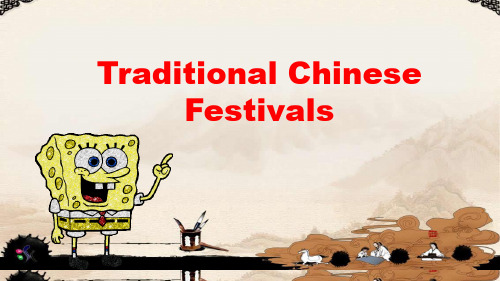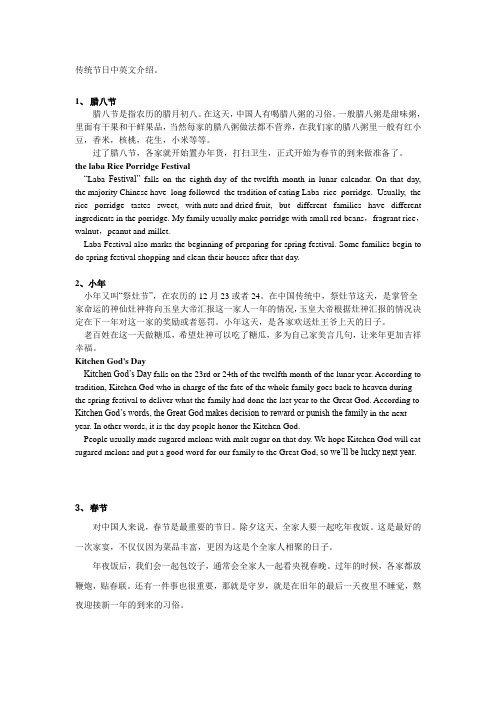中国传统节日英文版
(完整版)中国各种节日用英语怎么说

中国各种节日用英语怎么说
中国传统节日的英文翻译
春节the Spring Festival ( New Year's Day of the Chinese
lunar calendar)农历正月初一
元宵节(灯节)the Lantern Festival 农历正月十五
清明节the Qing Ming Festival/Tomb-sweeping Day四月五日
端午节the Dragon-Boat Festiva农历五月初五
中秋节the Mid Autumn Festival(the Moon Festival)农历八月十
五
重阳节the Double Ninth Festival农历九月初九
其它节日的英文翻译
元旦New Year's Day Jan.1
国际劳动妇女节International Working Women' s Day(Women's Day)Mar.8
国际劳动节nternatlonal Labor Day(May.Day)May.1
中国青年节Chinese Youth Day May.4
国际儿童节International Children's Day(Children's Day)
June .1
中国*诞生纪念日(党的生日)Anniversary of the Foundlng of the ChineseCommunist Party( the Party' s Birthday)July .1
建军节Army Day August .1
教师节Teachers ' Day Sept.1
国庆节National Dey Oct.1。
介绍中国传统节日的英语作文10篇

介绍中国传统节日的英语作文10篇1.Spring FestivalSpring Festival, also known as Chinese New Year, is the most important traditional festival in China. It usually falls in late January or early February. The festival lasts for 15 days and ismarked by various customs and traditions, including cleaning the house, decorating with red lanterns, giving red envelopes with money as gifts, and eating traditional foods like dumplings and glutinous rice cakes. The Spring Festival is a time for family reunions, and people from all over the world travel back to their hometowns to celebrate with loved ones.ntern FestivalLantern Festival, also known as Yuanxiao Festival, is celebrated on the 15th day of the first lunar month, which usually falls in February or March. During the festival, people hang colorful lanterns, eat sweet glutinous rice balls called yuanxiao, and participate in various activities such as solving riddles written on lanterns or watching lion and dragon dances. The Lantern Festival marks the end of the Chinese New Year celebrations.1.Qingming FestivalQingming Festival, also known as Tomb-Sweeping Day, is a traditional Chinese festival that falls on April 4th or 5th. It is a time for people to pay their respects to their ancestors bycleaning their graves, offering flowers, and burning incense. In addition to tomb-sweeping, people also participate in other traditional activities such as flying kites and eating qingtuan, a type of green rice cake.1.Dragon Boat FestivalDragon Boat Festival, also known as Duanwu Festival, is celebrated on the fifth day of the fifth lunar month, which usually falls in June. The festival is named after the dragon boat races that take place on this day, where teams of rowers compete to the beat of drums. People also eat zongzi, pyramid-shaped glutinous rice wrapped in bamboo leaves, and hang calamusand mugwort leaves to ward off evil spirits.1.Mid-Autumn FestivalMid-Autumn Festival, also known as Moon Festival, is celebrated on the 15th day of the eighth lunar month, which usually falls in September or October. The festival is named after the full moon, which is said to be the brightest and roundest on this day. People eat mooncakes, a type of pastry filled with sweet or savory fillings, and gather with family and friends to admire the moon and light lanterns.1.Double Ninth FestivalDouble Ninth Festival, also known as Chongyang Festival, falls on the ninth day of the ninth lunar month, which usually falls in October. The festival is associated with the number nine, which is considered lucky in Chinese culture. People climb mountains, drink chrysanthemum wine, and eat chongyang cake, a type of pastry made with chrysanthemum petals.1.Winter Solstice FestivalWinter Solstice Festival, also known as Dongzhi Festival, is celebrated on the shortest day of the year, which usually falls on December 21st or 22nd. The festival marks the arrival of winterand the beginning of longer days. People eat tangyuan, glutinous rice balls filled with sweet or savory fillings, and make offerings to ancestors and deities.1.Ghost FestivalGhost Festival, also known as Hungry Ghost Festival, falls on the 15th day of the seventh lunar month, which usually falls in August or September. The festival is a time to pay respects to the deceased and appease wandering ghosts. People offer food, incense, and paper money to the ghosts and perform traditional rituals to ward off bad luck.ba FestivalLaba Festival falls on the eighth day of the twelfth lunar month, which usually falls in January.The festival is named after the porridge, or laba porridge, that is traditionally eaten on this day.The porridge is made with rice, beans, and various nuts and fruits, and is believed to bring good luck and fortune for the coming year.1.Zhongyuan FestivalZhongyuan Festival, also known as Ghost Month, is a month-long festival that falls on the fifteenth day of the seventh lunar month, which usually falls in August or September. Thefestival is similar to the Ghost Festival, but is a more extended period of time where people pay respects to the deceased and offer food, incense, and paper money to the ghosts. People also perform traditional rituals to ward off bad luck during this time。
中国传统节日介绍英文版 ppt课件

Customs
Origin Brief introduction
The Double Seventh Festival, on the 7th day of the 7th lunar month, is a traditional festival full of romance. It often goes into August in the Gregorian calendar.
Mid-Autumn Day(中秋节) The Double Ninth Festival(重阳节) Winter solstice (冬至)
Spring Festival Introduction
Customs
Paste Spring Festival Couplets 贴春联 New Year paintings 年画 Paper-cuts 剪纸 Reunion dinner of the New year eve 年夜饭 The Spring Festival Gala 春节联欢晚会 Pay New Year‘s call 拜年 Lion Dance and Dragon Dance 舞龙 舞狮
Origin
Introduction
Historical material about the origin of the Dragon Boat Festival, there are many different versions, four influential: the first is that the summer solstice customs; The second is that Dragon Boat Festival from the Xia and Shang Dynasties that derived from the ancient times Wuyue national dragon totem worship; Third, the Dragon Boat Festival and the ancient "Bad Moon" and "evil day" linked; final say, most accepted view that the Dragon Boat Festival to commemorate Qu Yuan.
中国传统节日 英文版

The spring festival 春节 The Lantern Festival 元宵节 Tomb-sweeping Day 清明节 the Dragon Boat Festival 端午节 Double Seventh Day 七夕节 Mid-Autumn Day 中秋节
Double Seventh Day
——Chinese Valentine’s Day
Introduction
• full of romance • It' s on July 7th in the lunar calender each year • The Weaving Girl(织女) and the Cowherd(牛郎 ) in heaven would meet at the Magpie Bridge • Also called Begging-for-Dexterity Festival(乞 巧节)
• Many traditional customs and activities are held on the specified day by people in China and even by some people in neighbouring countries. Among these customs are dragon boat racing, eating zongzi, wearing a perfume pouch(香囊), tying fivecolour silk thread and hanging mugwort leaves(艾叶 ) and calamus(菖蒲).
Mid-Autumn Day 中秋节
中国传统节日介绍英文版

Mid Autumn Festival
Date
The 15th day of the eight lunar month, commonly in September or October
History and Tradition
Also known as the Moon Festival, it's a time for family reunions and moon gaming Traditions include eating mooncakes and landscapes made of various shapes and sizes
Characteristics
These festivals typically involve family gatherings, special foods, and activities that are deeply rooted in Chinese culture and often tied to lunar calendar dates, academic cycles, and any legends or historical events
Origin and History of Chinese Traditional Festivals
Incident Origins
Many Chinese festivals have their roots in any agricultural practices and beliefs, so as the Spring Festival (Chinese New Year) marking the end of winter and the beginning of the lunar new year, or the Mid Autumn Festival celebrating the harvest moon
英文版传统节日介绍

传统节日中英文介绍。
1、腊八节腊八节是指农历的腊月初八。
在这天,中国人有喝腊八粥的习俗。
一般腊八粥是甜味粥,里面有干果和干鲜果品,当然每家的腊八粥做法都不营养,在我们家的腊八粥里一般有红小豆,香米,核桃,花生,小米等等。
过了腊八节,各家就开始置办年货,打扫卫生,正式开始为春节的到来做准备了。
the laba Rice Porridge Festival“Laba Festival” falls on the eighth day of the twelfth month in lunar calendar. On that day, the majority Chinese have long followed the tradition of eating Laba rice porridge. Usually, the rice porridge tastes sweet, with nuts and dried fruit, but different families have different ingredients in the porridge. My family usually make porridge with small red beans,fragrant rice,walnut,peanut and millet.Laba Festival also marks the beginning of preparing for spring festival. Some families begin to do spring festival shopping and clean their houses after that day.2、小年小年又叫“祭灶节”,在农历的12月23或者24。
在中国传统中,祭灶节这天,是掌管全家命运的神仙灶神将向玉皇大帝汇报这一家人一年的情况,玉皇大帝根据灶神汇报的情况决定在下一年对这一家的奖励或者惩罚。
中国传统节日英文介绍
Qing Ming
Du Mu( Tang Dynasty )
Qing Ming usually comes with rainy days
பைடு நூலகம்
清明时节雨纷纷, 路上行人欲断魂, 借问酒家何处有, 牧童遥指杏花村.
I ask a Buffalo boy for tavern ['tævən] to release my sadness Passengers on the way are full of soreness
He points to the village covered by apricot ['eiprikɔt] blossoms
Chinese Valentine’s Day
The seventh day of the seventh month of the lunar calendar is known as Qi Xi Jie or Qiqiao Jie, a traditional holiday that has been recently called China's Valentine's Day.
In China, the most traditional and popular Spring Festival food is dumpling, which looks like the moon with vegetables and meat mixed in it. The Chinese name of dumpling is “JIAO ZI”, ”JIAO” means ”cross”, ”ZI” is Chinese traditional time represents “24:00”, so the Chinese word “JIAO ZI” means “cross 24:00”, just the dividing point of last year and next year. So when it comes to 24:00, every family begins eating dumplings.
中国传统节日 英文版
The Tomb-sweeping Day
Time It usually ranges from April 4th to April 6th in the Gregorian calendar of each year. Status It’s the most important festival of worship , and the most suitable for offering sacrifices to the ancestors and sweeping their grave. Of course, it’s also one of the four legal holidays. Origin and History It began about the Zhou Dynasty , having a history of over 2,500 years. Because people usually go out to relax themselves in the period, so it’s also called Outing Festival. Custom ① Sweeping the grave 扫墓
Logo
Pictures
The on January 15th in the lunar calendar of the new year, Which is the last day of the Spring Festival. Status It’s also an very important traditional festival, for it’s the first night when the moon turns to be full and bright of the new year. Origin and History As early as the Han Dynasty , it has been used as a day for sacrificing to the Emperor of Heaven and praying for blessing . Although time flies and all changes, it’s still popular with the people.
中国传统节日介绍英文版
国家或国际节日元旦New Year' s Day Jan.1国际劳动妇女节International Working women' s Day(wornen's Day) Mar.8国际劳动节nternatlonal Labor Day(May. Day)May.1中国青年节Chinese Youth Day May.4国际儿童节International Children's Day(Children's Day)June .1中国共产党诞生纪念日( 党的生日)Anniversary of the Foundlng of the ChineseCommunist Party ( the Party' s Birthday)July .1建军节Army Day August .1教师节Teachers ,Day Sept.1国庆节National Dey October.1中国传统节日春节the Sprlng Festival (NewYearls Day of the Chinese lunar calendar)农历正月初一元宵节(灯节) the Lantern Festival 农历正月十五清明节the Qing Ming Festival 四月五日前后端午节the Dragon-Boat Festiva 农历五月初五中秋节the MidAutumn Festival(the Moon Festival)农历八月十五重阳节the Double Ninth Festival 农历九月初九元旦(1月1日)NewYear'sDay春节(农历一月一日)theSpringFestival元宵节(农历一月十五日)theLanternFestival国际劳动妇女节(3月8日)InternationalWorkingWomen'sDay植树节(3月12日)ArborDay邮政节(3月20日)PostalDay世界气象节(3月23日)WorldMeteorologyDay清明节(4月5日)ChingMingFestival;Tomb-sweepingFestival国际劳动节(5月1日)InternationalLabourDay中国青年节(5月4日)ChineseYouthDay护士节(5月12日)Nurses'Festival端午节(农历五月初五)theDragonBoatFestival国际儿童节(6月1日)InternationalChildren'sDay中国共产党成立纪念日(7月1日)theParty'sBirthday建军节(8月1日)theArmy'sDay中秋节(农历八月十五)Mid-autumn(Moon)Festival教师节(9月10日)Teachers'Day重阳节(农历九月九日)Double-ninthDay国庆节(10月1日)NationalDay除夕(农历十二月三十日)NewYear'sEve阳历节日1月1日元旦(New Year's Day)2月2日世界湿地日(World Wetlands Day)2月14日情人节(Valentine's Day)3月3日全国爱耳日3月5日青年志愿者服务日3月8日国际妇女节(International Women' Day)3月9日保护母亲河日3月12日中国植树节(China Arbor Day)3月14日白色情人节(White Day)3月14日国际警察日(International Policemen' Day)3月15日世界消费者权益日(World Consumer Right Day)3月21日世界森林日(World Forest Day)3月21日世界睡眠日(World Sleep Day)3月22日世界水日(World Water Day)3月23日世界气象日(World Meteorological Day)3月24日世界防治结核病日(World Tuberculosis Day)4月1日愚人节(April Fools' Day)4月5日清明节(Tomb-sweeping Day)4月7日世界卫生日(World Health Day)4月22日世界地球日(World Earth Day)4月26日世界知识产权日(World Intellectual Property Day)5月1日国际劳动节(International Labour Day)5月3日世界哮喘日(World Asthma Day)5月4日中国青年节(Chinese Youth Day)5月8日世界红十字日(World Red-Cross Day)5月12日国际护士节(International Nurse Day)5月15日国际家庭日(International Family Day)5月17日世界电信日(World Telecommunications Day)5月20日全国学生营养日5月23日国际牛奶日(International Milk Day)5月31日世界无烟日(World No-Smoking Day)6月1日国际儿童节(International Children's Day)6月5日世界环境日(International Environment Day)6月6日全国爱眼日6月17日世界防治荒漠化和干旱日(World Day to combat desertification)6月23日国际奥林匹克日(International Olympic Day)6月25日全国土地日6月26日国际禁毒日(International Day Against Drug Abuse and Illicit Trafficking)7月1日中国共产党诞生日(Anniversary of the Founding of the Chinese Communist Party) 7月1日国际建筑日(International Architecture Day)7月7日中国人民抗日战争纪念日7月11日世界人口日(World Population Day)8月1日中国人民解放军建军节(Army Day)8月12日国际青年节(International Youth Day)9月8日国际扫盲日(International Anti-illiteracy Day)9月10日中国教师节(Teacher's Day)9月16日中国脑健康日9月16日国际臭氧层保护日(International Day for the Preservation of the Ozone Layer) 9月20日全国爱牙日9月21日世界停火日(World Cease-fire Day)9月27日世界旅游日(World Tourism Day)10月1日中华人民共和国国庆节(National Day)10月1日国际音乐日(International Music Day)10月1日国际老年人日(International Day of Older Persons)10月4日世界动物日(World Animal Day)10月5日世界教师日(World Teachers' Day)(联合国教科文组织确立)10月8日全国高血压日10月9日世界邮政日(World Post Day)10月10日世界精神卫生日(World Mental Health Day)10月14日世界标准日(World Standards Day)10月15日国际盲人节(International Day of the Blind)10月15日世界农村妇女日(World Rural Women's Day)10月16日世界粮食日(World Food Day)10月17日国际消除贫困日(International Day for the Eradication of Poverty)10月24日联合国日(United Nations Day)10月24日世界发展新闻日(World Development Information Day)10月28日中国男性健康日10月29日国际生物多样性日(International Biodiversity Day)10月31日万圣节(Halloween)11月8日中国记者节11月9日消防宣传日11月14日世界糖尿病日(World Diabetes Day)11月17日国际大学生节11月25日国际消除对妇女的暴力日(International Day For the elimination of Violence agai nst Women)12月1日世界爱滋病日(World AIDS Day)12月3日世界残疾人日(World Disabled Day)12月4日全国法制宣传日12月9日世界足球日(World Football Day)12月25日圣诞节(Christmas Day)12月29日国际生物多样性日(International Biological Diversity Day)1月最后一个星期日国际麻风节3月最后一个完整周的星期一中小学生安全教育日春分月圆后的第一个星期日复活节(Easter Monday)(有可能是3月22-4月25日间的任一天) 5月第二个星期日母亲节(Mother's Day)5月第三个星期日全国助残日6月第三个星期日父亲节(Father's Day)9月第三个星期二国际和平日(International Peace Day)9月第三个星期六全国国防教育日9月第四个星期日国际聋人节(International Day of the Deaf)10月的第一个星期一世界住房日(World Habitat Day)10月的第二个星斯一加拿大感恩节(Thanksgiving Day)10月第二个星期三国际减轻自然灾害日(International Day for Natural Disaster Reduction) 10月第二个星期四世界爱眼日(World Sight Day)11月最后一个星期四美国感恩节(Thanksgiving Day)农历节日农历正月初一春节(the Spring Festival)农历正月十五元宵节(Lantern Festival)农历五月初五端午节(the Dragon-Boat Festival)农历七月初七乞巧节(中国情人节)(Double-Seventh Day)农历八月十五中秋节(the Mid-Autumn Festival)农历九月初九重阳节(the Double Ninth Festival)农历腊月初八腊八节(the laba Rice Porridge Festival)农历腊月二十四传统扫房日。
中国传统节日(中英文对照)
中国传统节日(中英文对照简介)目录The Spring Festival(春节)Lantern Festival(元宵节)Qingming Festival(清明节)Dragon Boat Festival(端午节)Double Seventh Festival(七夕)Mid-Autumn Festival(中秋节)Double Ninth Festival(重阳节)Winter Solstice Festival(冬至)The Spring Festival(春节)The first day of the first lunar month is the New Year in the Chinese lunar calendar. Among the traditional Chinese festivals, this is the most important and the most bustling. Since it occurs at the end of winter and the beginning of spring, people also call it the Spring Festival.Chinese have many traditional customs relating to the Spring Festival. Since the 23rd day of the 12th lunar montha, people start to prepare for the event. Every family will undertake thorough cleaning, do their Spring Festival shopping, create paper-cuts for window decoration, put up New Year picturesb, write Spring Festival coupletsc, make New Year cakesd, and also prepare all kinds of food to bid farewell to the old and usher in the new.New Year's Eve is the time for a happy reunion of all family members, when they sit around the table to have a sumptuous New Year's Eve dinner, talking and laughing, until daybreak, which is called "staying up to see the year out". When the bell tolls midnight on New Year's Eve, people eat dumplings. In ancient times, midnight was called zishi (a period of the day from 11 p.m. to 1 a.m.). Dumplings (jiaozi) are eaten because it sounds the same as "change of the year and the day" in Chinese.From the first day of the lunar year, people pay New Year calls on relatives and friends, which is an important custom for the Spring Festival.Setting off firecrackers is the favorite activity of children in the Spring Festival. According to legend, this could drive off evil spirits. The continuous sound of firecrackers can be heard everywhere, adding to the atmosphere of rejoicing and festivity.Many places hold temple fairs. The wonderful dragon lantern dance and the lion dance performances, along with various handicraft articles and local snacks attract thousands of people.With the development of the times, some changes have taken place in the customs of spending the Spring Festival. For example, to prevent environmental pollution, many cities have banned firecrackers. But this does not have an impact on the happy atmosphere of the festival. On New Year's Eve, family members get together to have dinner while watching TV programs.For Chinese at home and abroad, the Spring Festival is always the most important festival.农历的正(zheng)月初一,是中国的农历新年。
- 1、下载文档前请自行甄别文档内容的完整性,平台不提供额外的编辑、内容补充、找答案等附加服务。
- 2、"仅部分预览"的文档,不可在线预览部分如存在完整性等问题,可反馈申请退款(可完整预览的文档不适用该条件!)。
- 3、如文档侵犯您的权益,请联系客服反馈,我们会尽快为您处理(人工客服工作时间:9:00-18:30)。
The Goddess Chang's fly to the moon 嫦娥奔月
Cháng’é bēn yuè
.
Moon Cake 月饼 yuèbǐng
.
Hale Waihona Puke Enjoy the glorious full moon with famlies or friends
(Xī’ ān 2016)
Drink sweet scented osmanthus wine
.
Perfume pouch
Silk cloth Herbal medicine
.
.Calamus .Galic .Perfume pouch
.
Valentine’s Day in China 七夕 qī xī
The seventh day of the seventh lunar month
.
.
Door-god
.
Spring Festival Eve Family reunion The New Year’s Feast
Auspiciousness Abundance Richness
.
Lucky money 红包 hóng bāo
Fireworks yān huā
.
Spring Festival Greetings Greetings to parents or famlies Northern Chinese: eat jiǎo zi Southern Chinese: nián gāo
The bridge of magpies
.
Release lotus lanterns on water
.
Mid-Autumn Festival 中秋节 zhōng qiū jié Fifteenth day of the eighth month
Flourishing in the Song Dynasty
Appreciate chrysanthemums
.
Drink well water.
.
Eat yuán xiāo or tāng yuán
.
.
.
The dragon boat Festival 端午节 duān wǔ jié
5th day of the 5th lunar month
.
qīng tuán(S)
zòng zi
.
Dragon-shaped canoe
.
Customs Guessing lantern riddles
cāi dēng mí
.
What kind of dog doesn't bite or bark?
Hot dog
.
What month do soldiers hate?
March
.
What kind of water should people drink in order to be healthy?
.
Lion dancing wǔ shī Dragon lantern dancing wǔ lóng
.
The Lantern Festival 元宵节
yuán xiāo jié
huā dēng
.
15th day of the 1st lunar month
The carnival of ancient China
春运 chūn yùn
.
.
Spring Festival
1st day of the 1st lunar month Spring Festival Eve – 15th of the first month ( Lantern Festival)
.
.
Spring Festival couplets 春联 chūn lián
Chinese Traditional Festivals
.
Lunar Calendar 农历 nóng lì
.
Chinese Zodiac
.
Spring Festival 春节 chūn jié
Most important Get together
.
Transport during the Spring Festival
.
Double Ninth Festival 重阳节 chóng yáng jié
9th day of the 9th lunar month
The Tang Dynasty It was officially designated as the folk festival.
.
Ascend a height and enjoy a distant view
